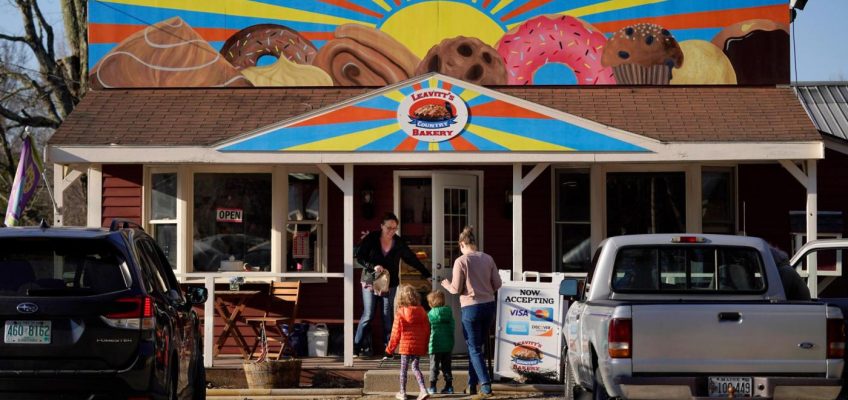By KATHY McCORMACK, Associated Press
CONCORD, N.H. (AP) — A New Hampshire town’s attempt to force a bakery to remove or alter its painting that shows sunbeams shining down on a mountain range of doughnuts, a muffin, a cinnamon roll and other pastries is unconstitutional, a judge ruled in a First Amendment dispute.
The town of Conway infringed on the free speech rights of bakery owner Sean Young, U.S. District Judge Joseph Laplante ruled Monday, following a one-day trial in February.
FILE — A T-shirt showing the painting displayed outside Leavitt’s Country Bakery, is displayed in the store in this April 13, 2023 file photo, in Conway, N.H. (AP Photo/Robert F. Bukaty, file)
He ordered the town to stop any efforts at enforcing its sign code regarding the mural painted by high school students atop Leavitt’s Country Bakery, mentioning a “complete disconnect between what the ordinance purports to regulate and the town’s enforcement, as well as the illogical way it applied and explained that enforcement” to Leavitt’s.
“I’m thrilled that the students’ artwork can remain up, I’m thrilled that my First Amendment rights have been vindicated, and I’m thrilled that the community can continue to enjoy the beautiful piece of art,” Young said in a statement. “I think our mural is a wonderful depiction of everything that makes the Mount Washington Valley such a great place to live.”
Young asked for $1 in damages. A lawyer representing Conway said they were disappointed by the outcome, but agreed with Laplante that the town and its officials “conducted themselves conscientiously and in good faith in managing town business.”
The community of more than 10,000 people in the White Mountains draws skiers, nature lovers and shoppers. Some residents want regulations enforced as they worry about overdevelopment in the tourist town.
When the mural went up in June 2022, it attracted a lot of compliments and visitors, including one from a town zoning officer.
The zoning board decided that the painting was not so much art as advertising. The board determined it was a sign, and so it could not remain as is because of its size. At about 90 square feet, it’s four times bigger than the local sign code allows.
If the painting didn’t show what’s sold inside — baked goods — it wouldn’t be considered a sign and could stay, board members said.
The town has shown that “restricting the size of signs serves the significant government interest of preserving the town’s aesthetics, promoting safety, and ensuring equal enforcement,” lawyers for Conway said in a court document.
Laplante said Conway’s interests “are undermined if the only regulated displays are those that depict products or services sold on the premises where the display is located, and no others.”
Young sued in 2023 after he was told to modify or remove the painting, which he said was never intended to be a sign. He was faced with possible misdemeanor criminal charges and fines after his appeals were rejected.
Both sides agreed in court that the town’s definition of a sign is very broad and even the judge said it seemed to include “everything.”
A sign in Conway is “any device, fixture, placard, structure or attachment thereto that uses color, form, graphic, illumination, symbol, or writing to advertise, announce the purpose of, or identify the purpose of any person or entity, or to communicate information of any kind to the public, whether commercial or noncommercial.”
The town “will continue to work conscientiously and in good faith to ensure that the constitutional rights of all are not infringed, while maintaining public safety and Conway’s natural beauty,” Brooke Lovett Shilo, one of the lawyers representing Conway, said in a statement Monday.


Leave a Reply